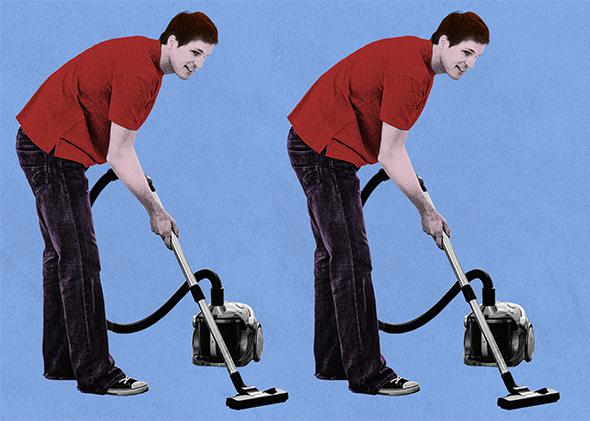Did you know that there are people in this world who do not see a “point” in spring cleaning? It’s true; in fact, some of them have revealed their existence in the comments sections of previous posts in this series. That attitude, though unfortunate, is perfectly understandable, but it’s based on a widespread misconception about the project: Namely, that the endgame of spring cleaning is a hallowed moment in which your house will be perfectly, immaculately, Edenically clean. Wrong.
Spring cleaning’s most important lesson, in fact, may be that perfection is not only impossible, but even undesirable. Each year when I sit down to make the list of things I’d like to clean or improve in our house, I find it useful to remind myself that it was the cleanest it has ever been—or ever will be—the day my partner and I moved in. On that happy morning, the hardwood floor was gleaming with possibility, the refrigerator still alabaster in the absence of dirty hands, and the shower grout unsullied by humid human contact. But the moment we crossed the threshold, bringing with us a filth tsunami of scuff marks, skin cells, and spill potentialities, paradise was forever lost. No matter how hard we scrub, how diligently we wipe, how frequently we invoke the vacuum, we can never actually achieve perfection.
So what to do with that realization? Like those sad folks who don’t see much point in making the bed because you’re getting back in it later anyway, you could give up and not bother cleaning in the spring or, while you’re at it, anytime at all. But say you don’t want to be profligately gross—what then? Is it possible to turn the fundamental futility of cleaning from an excuse into an asset?
Here’s my pro-tip: Embrace entropy. Entropy, in case you don’t recall your physics, is, loosely (and somewhat poetically) speaking, the tendency of systems—like a wine glass perched on the edge of a table or the alluring surface of an empty kitchen sink—to evolve from order to disorder, from organization to chaos. Even as you have just finished the most intensive spring cleaning imaginable, entropy is already chipping away at something somewhere in your house. That streak-free shine you just achieved on your windows? The local pigeons are on their way to fete your accomplishment.
As a practical matter, embracing entropy means adapting your cleaning workflow to work with it, not against. Treating entropy like an obstacle to be overcome through sheer force of will and Scrubbing Bubbles won’t work: In my experience, people who, in a moment of lucidity, exclaim “Oh my God this place is a pigsty!” and then furiously attempt spring cleaning-level projects in the space of a day or two end up worse off than they started, certainly by winding up demoralized and occasionally by ruining the rug with bleach (entropy’s revenge!).
Instead, internalize the truth that it is literally impossible for everything be done at a single point, so that even as you strive for perfection, you will be satisfied when you achieve something short of it. It’s like that poster in your elementary school gym said: “Shoot for the moon, because even if you miss, you’ll land among the stars.” Don’t mind the astronomical inaccuracy; for our purposes, the moon is perfection and the stars are a flawed, but still pretty damn clean house where you’ll be happy to land.
To make that kind of landing more likely, it’s best to approach spring cleaning somewhat piecemeal and with a generous timeframe. I, for example, have given myself a month to get through my list. On a recent Sunday, I took an hour to clean under the oven and the fridge (which, yuck). I did not get to the inside of the oven yet, but I will. My partner likes magic erasing, so he will escort one of those around the house at some point soon. The windows I’ll tackle on the next sunny Saturday. You get the (Windexed-when-I-get-to-them) picture. This by-and-by model means, of course, that there will not be a big HGTV-style reveal after three days of insane work, but I’m at peace with that—by early May, this old house will still be much improved.
That’s a great thing, of course, but visible results are not the only benefit of embracing entropy. There’s also something fundamentally healthful in treating your house like a life’s work instead of a problem that can be solved with one weird trick. Martha Stewart hints at this when she writes “households … are works in progress where there is always something needing immediate attention and always something more that can be done.” A perfectly clean, “finished” house is necessarily a dead thing. A home, on the other hand, can never truly be finished. It is the noble struggle against mess that gives energy and “lived-in-ness” to a space, not some hypothetical triumph over it. Housekeeping is an endless task, but it is not a useless one—indeed, it appears to be one of the few examples in life in which futility actually bears fruit.
Up Next: Homemaking makes the home.
